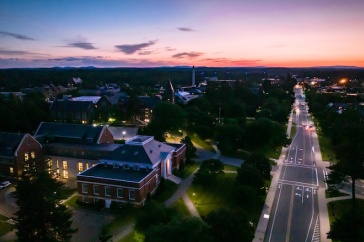Two UNH faculty, Serita Frey and Stuart Grandy, both from the College of Life Sciences and Agriculture, were included in Clarivate’s 2023 Highly Cited Researchers list, which identifies the top 0.1% of the world’s scientists who have demonstrated significant and broad influence in their field or fields of research. The list is made up of influential researchers at universities, research institutes and commercial organizations.

Serita Frey, professor of natural resources and the environment, is a leading researcher on soil microbial ecology. Frey’s research focuses on how human activities — climate change, agricultural management, invasive species — affect ecosystems, with an emphasis on soil microorganisms and nutrient cycling. Her research team maintains five long-term global change experiments at the Harvard Forest Long-term Ecological Research site.
Stuart Grandy, professor of natural resources and the environment, is a leading researcher in soil fertility and biogeochemistry. He leads a research program that examines the role of soil organisms in regulating soil carbon cycling, trace gas emissions, nitrogen cycling and productivity. His team, which integrates microbial-explicit models, emerging biogeochemical concepts and data, is currently focused on soil health, soil organic matter dynamics and rethinking nitrogen cycling in agroecosystems. They are also examining from where and how plants and microbes obtain nitrogen — an element critical to crop production but also easily lost to the environment — to improve the efficiency of nitrogen use.

Professor Stuart Grandy and
Lab Manager Amanda Daly
Both Frey and Grandy are co-directors of the Center of Soil Biogeochemistry and Microbial Ecology, along with Jessica Ernakovich, associate professor of microbial ecology and biogeochemistry. The center’s goal is to understand the impact of environmental change on ecosystems and tackle global challenges like ecosystem degradation, soil-climate feedbacks and sustaining agricultural productivity.
Analysts at the Institute for Scientific Information (ISI) recognized 6,849 Highly Cited Researchers in 2023, from more than 1,300 institutions in 67 nations and regions. The evaluation and selection process draws on data from the Web of Science citation index, together with analysis performed by bibliometric experts and data scientists at the ISI at Clarivate.
Citations — references to source information upon which new research is built — are an important, if imperfect, metric for academic research productivity. The number of citations can indicate the impact of research on one’s field; researchers whose work is highly cited can be considered to contribute fundamental knowledge to a field of study.
-
Written By:
Sarah Schaier | College of Life Sciences and Agriculture
















































